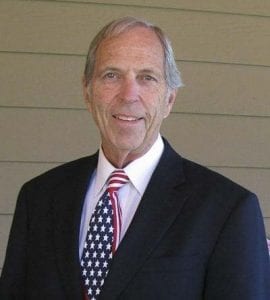Op-ed: ‘Congress and the federal establishment have taken over everything’
Editor’s note: Opinions expressed in this Op-ed column are those of the author alone and do not reflect the editorial position of ClarkCountyToday.com
Marvin Case
Vancouver

We are in the midst of an impeachment trial in the U.S. Senate where many of the arguments being raised focus on the U.S. Constitution and what the authors of that cherished document intended when they wrote it more than 200 years ago.
The current debate brings to mind another important constitutional issue that has been overlooked for years and that is the all-important issue of the commerce clause.
Those ingenious men who wrote the Constitution believed in the rights of states to govern themselves. That was the tenor of the times when the country won the Revolutionary War and decided to chart a course free from the oversight and taxation of the United Kingdom. In fact, the Constitution specifically states that the federal government possesses only those powers delegated to it or enumerated in the Constitution. All other governmental responsibilities were to remain with the states.
But in the Constitution, the federal government was given specific responsibility to regulate commerce between states, commerce involving foreign countries, and commerce involving Indian tribes.
That “commerce clause” has been used by the Congress to apply to virtually every aspect of life in America.
The Congress is now able to pass almost any law affecting the American people by attaching the “commerce clause” as the justification.
Whereas the commerce clause was initially intended to level the playing field between colonies that had ports and access to water and those that did not, it is now used as the basis for governing all aspects of American life.
My question is: where is the debate over what the founders intended by the commerce clause? It’s fine to debate their intent as regards to impeachment (“high crimes and misdemeanors”) but it’s time to take constitutional debates a little further and pursue “intent” as regards the commerce clause.
Did the framers of the Constitution intend to create a huge conflict by saying, on the one hand, that the federal government possesses only those powers enumerated or delegated to it in the Constitution, while on the other giving the federal government the power to regulate interstate commerce which has been interpreted to mean every aspect of life? Not likely. They were specific in the limitations on the federal government and allowing the states to handle everything else. They did not imagine that the federal government would use its power to regulate interstate commerce to affect every aspect of life.
Admittedly, few enterprises in today’s world are confined to the boundaries of only one state. Farmers who sell only at road-side stands may buy seed and fertilizer that are created in other states. If they don’t, then the in-state seed and fertilizer manufactures may well deal across state lines. Is the farmer then involved in interstate commerce? What about abortion doctors? If a doctor is trained in one state and then establishes his career in another, can the federal government regulate his activities? Maybe his instruments are manufactured in another state. Is that what the framers had in mind?
Because my pencils are made in Tennessee and my copy machine is made in California, can the federal government regulate my newspaper which has only local distribution? Do the “navigable waters of the United States,” regulated by the federal government, include small streams that run strictly within the borders of one state?
The fact is, the Congress has expanded its powers to regular interstate commerce without limitation. Is there any aspect of life that the Congress agrees rests solely with the states to regulate? How do members of Congress or Constitutional scholars explain the 10th amendment, ratified with the Bill of Rights in1791, which limits the power of the federal government to only enumerated things?
While this writer is keenly interested in this issue, it’s basically moot: Congress and the federal establishment have taken over everything. Despite what the Constitution says, there are virtually no activities that the federal government defers entirely to states.
And no one seems to care.




